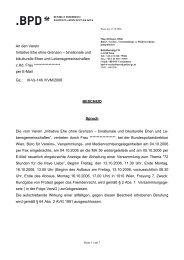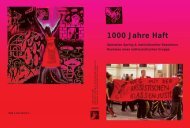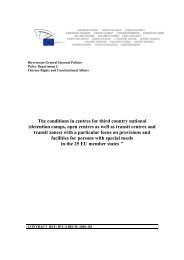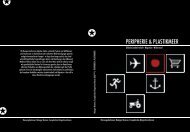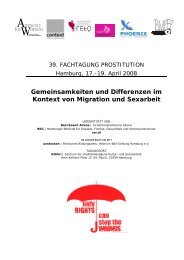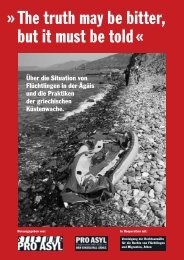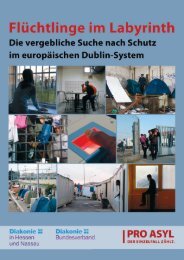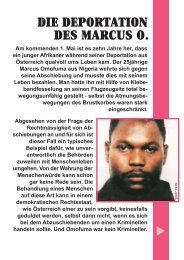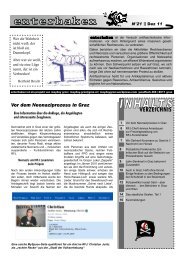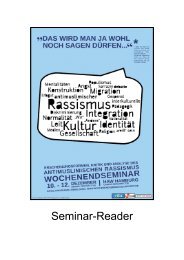Turin's CIE - International University College of Turin
Turin's CIE - International University College of Turin
Turin's CIE - International University College of Turin
Create successful ePaper yourself
Turn your PDF publications into a flip-book with our unique Google optimized e-Paper software.
2. THE SITUATION INSIDE TURIN’S <strong>CIE</strong><br />
Our study shows that many <strong>of</strong> the international and European protections for asylum seekers<br />
are at best respected in form. A number <strong>of</strong> detainees obtain information about their rights via<br />
informal channels such as communication with other detainees 170 . There appears to be a<br />
concerted attempt to dissuade detainees from asking for asylum- a lawyer working at the <strong>CIE</strong><br />
noted that detainees were frequently questioned about their desire to apply for asylum and at<br />
times they were misinformed about their legal rights 171 . At least in part, this could be attributed<br />
to an inherent conflict <strong>of</strong> interest because all <strong>of</strong> the <strong>CIE</strong> staff whether it be interpreters, Red<br />
Cross or the police are essentially government paid and hence there is no way to access a<br />
completely independent source <strong>of</strong> information at the <strong>CIE</strong>:<br />
“For example, translators seem to be good people who are trying to understand if there are<br />
problems or not but the problem is that they are paid from the Red Cross and the director<br />
<strong>of</strong> this camp is from the Red Cross. In any case, even if they are good people, they are paid<br />
by Red Cross, they are not following the interest <strong>of</strong> the person [detainee], but the interests<br />
<strong>of</strong> the camp. For example, when detainees are speaking with translators about conditions<br />
for political asylum, they will remind them that if they ask for political asylum they won’t<br />
go back to their country” (Interview 7).<br />
In the words <strong>of</strong> another lawyer:<br />
“There is a sort <strong>of</strong> word <strong>of</strong> mouth among guys detained in the same area, especially among<br />
those who may not have a lawyer, this happened for example with many Tunisians. Many<br />
<strong>of</strong> them apply for asylum but then they say: "No, I don't really want asylum, I want the<br />
humanitarian permit", because some <strong>of</strong> them more or less understand what asylum is and<br />
understand that they want something different but they just don't know the proper<br />
procedure since nobody ever explains it to them. Nobody inside <strong>CIE</strong> explains to them what<br />
asylum is and what the procedures are. They don't know what the Commission 172 is. Some<br />
get more precise information through their lawyers, at least I hope so. Most <strong>of</strong> them only<br />
apply for asylum once they are inside <strong>CIE</strong>, and not before, and they do it [apply] a little bit<br />
randomly, without knowing exactly what asylum is and what its function is. […] There is no<br />
information” (Interview 8).<br />
Even more alarmingly, in practice there is no prohibition on deportation in the period between<br />
when a request for asylum is first made and when that request is formalised by being<br />
Maria Bethke and Dominik Bender, Förderverein PRO ASYL e.V., The Living Conditions <strong>of</strong> Refugees in Italy,<br />
27 February 2011 .<br />
170 “Everyone here knows. Nearly everyone has asked for asylum, like the Tunisians who arrived from<br />
Lampedusa. Between us we get information” (Interview 12).<br />
171 “Also, for example, once a person asks for political asylum they say: “Okay, but are you really sure that you<br />
want to ask for political asylum? Because you know, if they accept your request you can never go back to your<br />
country”. It is something I know directly from the director <strong>of</strong> the <strong>CIE</strong>. He told me that this is what they tell<br />
[detainees]. Because from their point <strong>of</strong> view all requests are not really requests for political asylum and it is<br />
something that they [detainees] are doing just to have a chance to go out <strong>of</strong> the camp. In fact, [if you get refugee<br />
status] you really cannot go back, because Italian authorities will think you have no problems, but you can go<br />
[back to your country <strong>of</strong> origin] with another kind <strong>of</strong> protection, humanitarian for example. But this is<br />
something they say to avoid a request. […]They [detainees] are not well informed about their rights, I would<br />
say” (Interview 7).<br />
172 The Commissione territoriale per il riconoscimento della protezione internazionale is an administrative body<br />
under the authority <strong>of</strong> the Ministry <strong>of</strong> the Interior. Its function is to examine and decide on the applications for<br />
the recognition <strong>of</strong> the refugee status or the subsidiary protection status. There are ten Commissioni Territoriali<br />
in Italy. Each <strong>of</strong> them is competent over a territory that comprises a number <strong>of</strong> provinces.<br />
80 | P a g e




